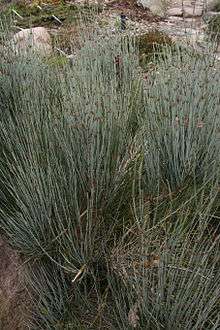Ephedra intermedia
| Ephedra intermedia | |
|---|---|
 | |
| Ephedra intermedia | |
 | |
| Female cone | |
| Scientific classification | |
| Kingdom: | Plantae |
| Division: | Gnetophyta |
| Class: | Gnetopsida |
| Order: | Ephedrales |
| Family: | Ephedraceae |
| Genus: | Ephedra |
| Species: | E. intermedia |
| Binomial name | |
| Ephedra intermedia Schrenk & C.A.Mey. | |
| Synonyms[1] | |
| |
Ephedra intermedia, with the Chinese common name of Zhong Ma Huang, is a species of Ephedra that is native to Siberia, Central Asia, Iran, Afghanistan, Pakistan, the western Himalayas, Tibet, Mongolia, and China.[1][2][3]
Description
Ephedra intermedia is found in deserts, grasslands, floodlands and river valleys, slopes and cliffs, and sandy beaches. It grows at elevations of 100–4,600 metres (330–15,090 ft), in rocky or sandy dry habitats.
The plant grows to 1 metre (3.3 ft) tall. The strobili are dioecious, either male or female on any one plant, so both male and female plants are needed for seeds.
Taxonomy
It was originally described by Alexander Gustav von Schrenk and Carl Anton von Meyer in 1846. It was placed in section Pseudobaccatae (=sect. Ephedra sect. Ephedra), "tribe" Pachycladae by Otto Stapf in 1889.
In 1996 Robert A. Price classified E. intermedia in section Ephedra without recognizing a tribe.[4]
References
- 1 2 Kew World Checklist of Selected Plant Families
- ↑ Peschkova, G.A. (2005). Synopsis of the Siberian Ephedra species (Ephedraceae). Botanicheskii Zhurnal. Moscow & Leningrad 90: 423-436.
- ↑ Flora of China, Vol. 4 Page 98, 中麻黄 zhong ma huang, Ephedra intermedia Schrenk ex C. A. Meyer, Mém. Acad. Imp. Sci. Saint-Pétersbourg, Sér. 6, Sci. Math., Seconde Pt. Sci. Nat. Sci. Nat. 5: 278 1846
- ↑ Price, R. A. (1996). Systematics of the Gnetales: A review of morphological and molecular evidence. International Journal of Plant Sciences, 157(6): S40-S49.